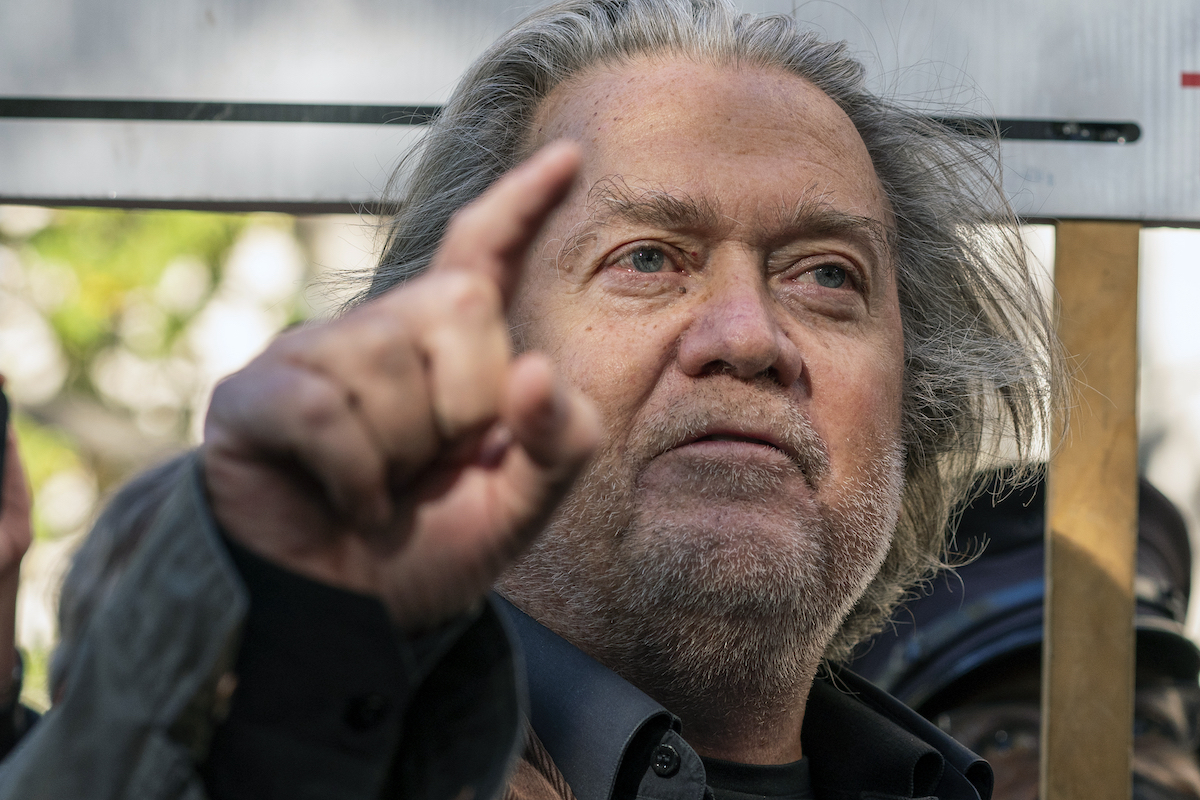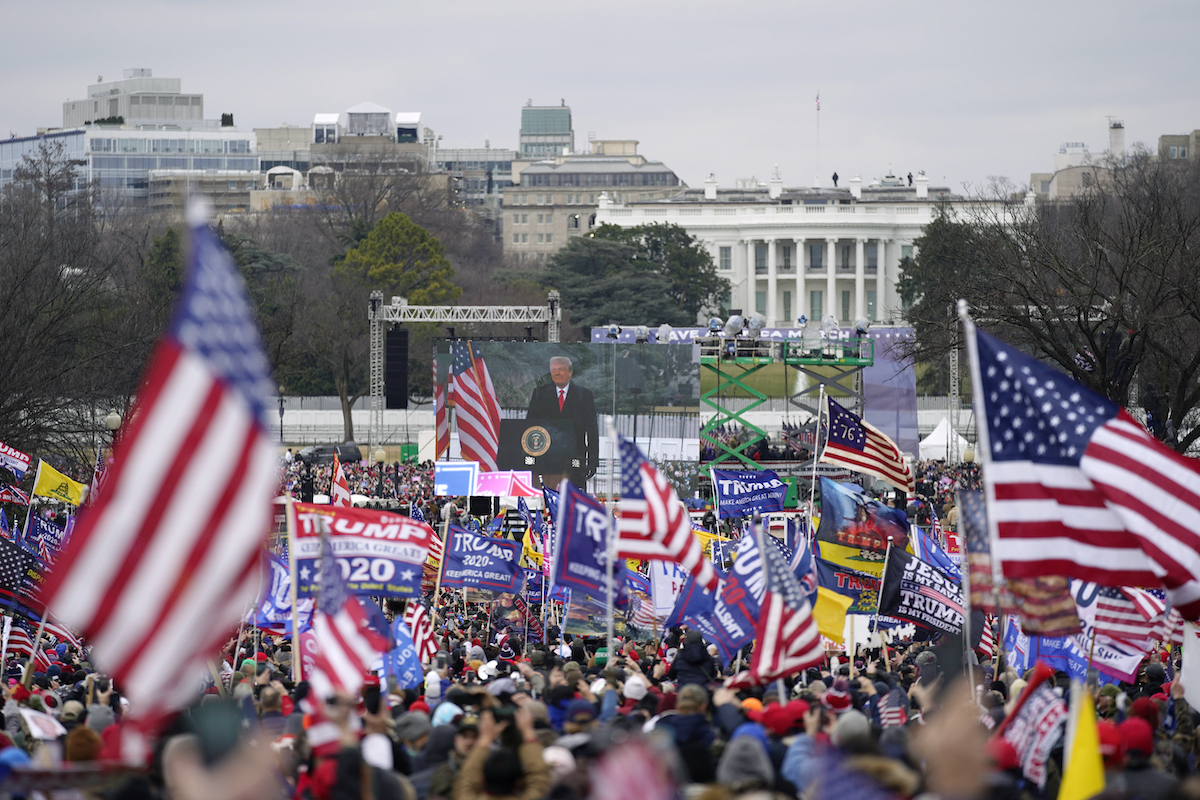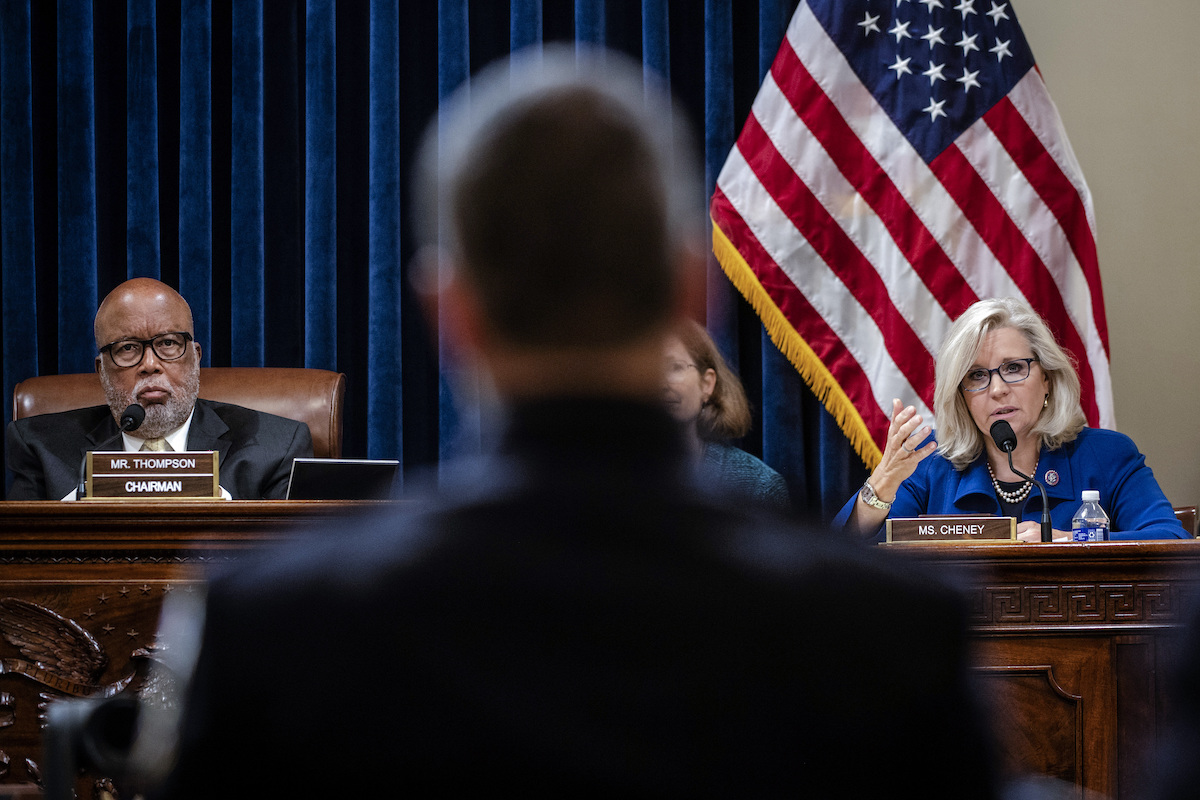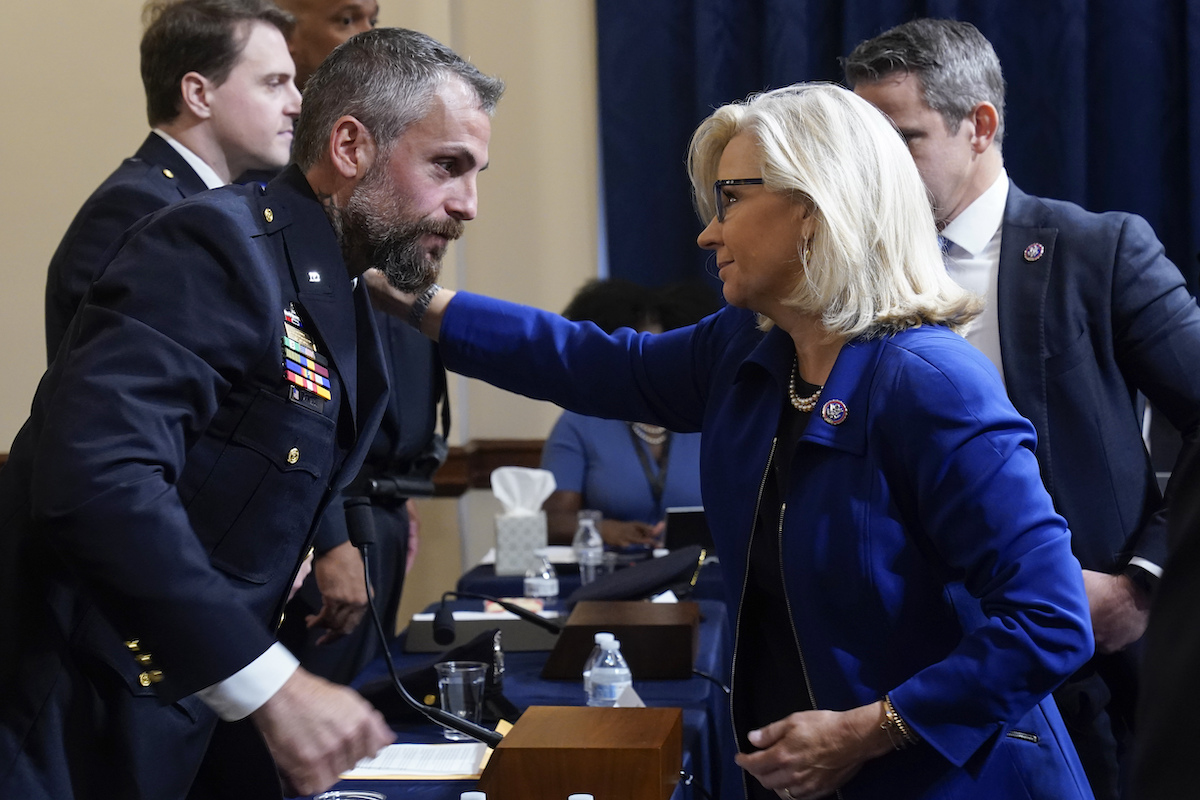Stand up for the facts!
Our only agenda is to publish the truth so you can be an informed participant in democracy.
We need your help.
I would like to contribute
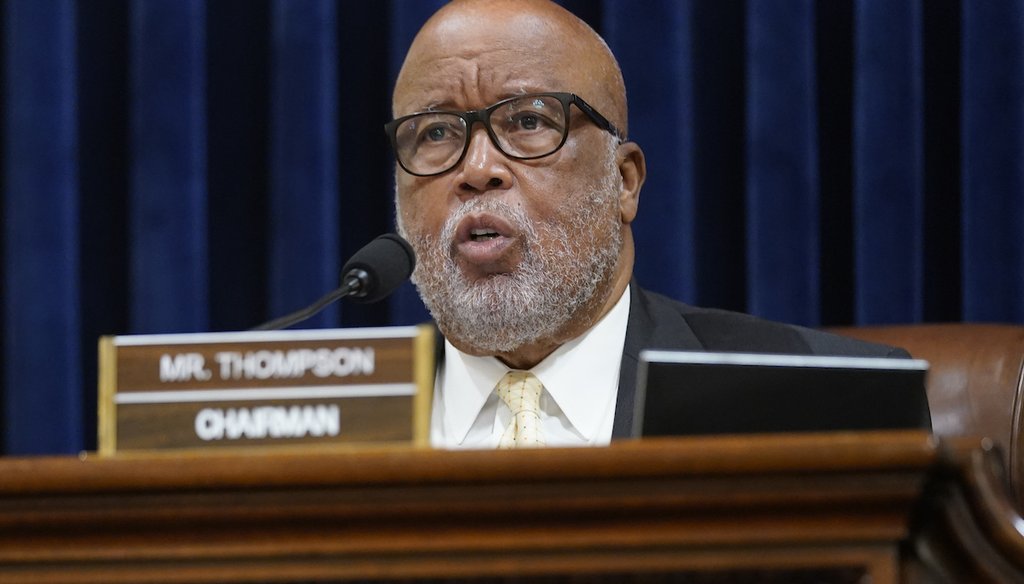
Chairman Rep. Bennie Thompson, D-Miss., speaks during the House select committee hearing on the Jan. 6 attack on Capitol Hill, July 27, 2021. (AP)
If you want to get a feel for what drives the House committee investigating the Jan. 6 attack on the Capitol, it helps to go back to Bolton, Miss., in 1973.
That year, the rural town of about 780 people was on the verge of achieving a milestone of racial equality: A slate of Black candidates was ready to make a bid for every town office, from mayor on down.
Bennie Thompson won the mayor’s race, 217 to 199. Then, the losing white candidates claimed illegal votes had been cast, and a majority-white town executive committee decertified the results.
It was the 1970s Mississippi version of "Stop the Steal," and it would take three months of court battles for Thompson to secure his victory.
Nearly half a century after that election in Bolton, Thompson finds himself on contested ground again, as chairman of the House select committee investigating the Jan. 6 attack and the effort to subvert the results of another election — the 2020 presidential vote.
Sign up for PolitiFact texts
Thompson was up in the gallery of the House chamber that afternoon as, on the floor below, Capitol Police tried to repel rioters who were seeking to disrupt the electoral vote certification and threatening to execute the vice president. He says his years in Bolton were on his mind that day.
"I said I'm damned if I'm going to let these folk break in here and see me afraid of what they're doing."
The breach of the Capitol didn’t just lead to death and mayhem. It rattled America’s standing as a democracy rooted in the peaceful transfer of power, and it left a divided nation more deeply scarred. A torrent of misinformation from Trump and his supporters continues to fuel disparate narratives of what happened.
Where Democrats see rioters stoked by Trump and his myth of a stolen election, Republicans speak of patriots carried away by love of country. Democrats see a threat to the Constitution and a concerted effort to overthrow an election; Republicans focus on Capitol policing and intelligence failures.
Democrats had hoped to bring some coherence to it all with an investigation that followed the path of the 9/11 Commission — a fully bipartisan inquiry that operated outside of Congress. But Republicans scuttled that plan. Chris Kojm, who served in the Clinton and Obama administrations and was the 9/11 Commission’s deputy director, said that underscores a key difference between the two events.
"The 9/11 attack brought our country together," Kojm said. "This one has divided it."
So Thompson’s committee heads into its work knowing a large chunk of the electorate, urged on by Republican leaders, has already written it off as a partisan smear.
"This is a political select committee," House Republican leader Kevin McCarthy, R-Calif., said Sept. 2. House Speaker Nancy Pelosi "did something that no speaker has ever done — denied Republicans the right to appoint people to it." (In fact, Pelosi rejected two of five names that McCarthy recommended for the committee, after which McCarthy pulled his entire slate from consideration.)
What remains of the committee is nominally bipartisan, but the two Republican members are apostates within their own party. Both Rep. Liz Cheney, R-Wyo., and Rep. Adam Kinzinger, R-Ill., have broken with Republican orthodoxy and say that Trump foisted the "big lie" of a stolen election on the American people. They say he bears responsibility for the chaos that followed, and voted to impeach him over it.
That stance points to the fundamental shadow under which the committee operates. So far, every Republican who dared to acknowledge Trump’s culpability has encountered stiff opposition from fellow party members. All but one of the 10 House Republicans who voted to impeach Trump have been censured by party officials in their home states. Cheney was stripped of her leadership post in the House Republican caucus.
The committee’s mandate is to produce the definitive narrative of what led up to the Jan. 6 attack, what happened during it and in the days that followed, and what should be done to prevent it from ever occurring again.
But the real test facing this committee, Kojm said, is whether, amid turbulent political waters, it can deliver a bipartisan account that is faithful to the facts — and that most Americans will believe.
What will subpoenas uncover?
Former White House strategist Steve Bannon speaks with reporters after departing federal court, Nov. 15, 2021, in Washington. Bannon faces contempt charges after defying a subpoena from the House committee. (AP)
So far, there’s not much to see of the committee’s work. Its headquarters are in the Longworth House Office Building just across the street from the Capitol, while most of its 40 or so investigators and staffers are scattered in offices across Capitol Hill.
Its public events have been minimal. The committee’s only hearing so far featured testimony from police officers who were beaten and pepper sprayed by rioters, and no others have been scheduled yet. Committee members convened to recommend that Trump associate Steve Bannon face contempt charges for resisting a committee subpoena. He has since been indicted.
There’s a lot left to unpack. The committee’s investigation goes back months before the 2020 election, when Trump claimed that he could lose only through a rigged vote. It is piecing together what Trump associates such as Bannon, Roger Stone and Rudy Guiliani did to fuel the campaign to derail the counting and certification of legitimate votes, especially their work out of a hotel across from the White House leading up to the day of the attack. It is probing the policing and intelligence failures that left the Capitol vulnerable.
For an event where so much has already been reported, the committee’s best chance at learning something new may hang on what its subpoenas uncover. The process of gathering documents and deposing witnesses grinds away out of public sight. At last count, staff had talked with over 250 people. The committee’s request for telecommunications records, emails and memos has produced thousands of pieces of evidence to review.
The committee wants to probe who within Trump’s circle knew what might unfold on Jan. 6, and who helped finance the groups that showed up in tactical gear carrying bear spray and other weapons.
"You always think you know a lot until you look at the documents," said Kojm, the 9/11 Commission staffer. "Getting access to the records is so very important. We learned all kinds of crazy things about 9/11 that were not known."
The commission found, for example, that Air Force commanders made it appear that they had learned about two of the hijacked planes in time to do something about them. In fact, civilian and military air traffic control logs showed they were told far too late, and Air Force fighter jets "were in the wrong place to be able to help."
Piecing together phone and email records, social media posts, and banking transactions might reveal exactly how the Jan. 6 attack unfolded, and pinpoint whom, including members of Congress, the committee should question.
Thousands of people gathered at a rally near the White House Jan. 6, 2021, to show their support for President Donald Trump and his baseless claims of election fraud. (AP)
Perhaps the committee’s biggest challenge of the moment is the court battle over access to White House records.
In a novel twist, Trump has invoked executive privilege, even though he is no longer in office. Bannon, who left the White House in August 2017, followed suit to prevent the committee from learning what Trump and his inner circle shared among themselves and others before, during and after the attack.
Elise Bean, a former Senate investigator, is encouraged by an initial court ruling that said if the Biden White House has cleared the release, Trump’s claim fails.
"It is a victory for Congress, as much as for the committee," Bean said. "The committee has a chance to get a square ruling that Congress’ oversight work takes precedence over a former president's claims of executive privilege"
For Cheney, the efforts to stymie the committee appear to reveal one thing.
"They suggest that President Trump was personally involved in the planning and execution of January 6th," Cheney said Oct. 19. "And we will get to the bottom of that."
To get there, though, the committee must pierce the curtain of legal objections to get at material that so far remains out of reach. And it must do that fairly soon. Because if Republicans win back the House in 2022, there’s little doubt they will disband the committee or steer it in another direction.
An unlikely alliance
Committee Chair Rep. Bennie Thompson (D-Miss.), left, listens as Rep. Liz Cheney (R-Wyo.), right, questions police officer Michael Fanone. (Washington Post via AP, Pool)
Capitol Hill occasionally produces odd political partnerships, but it would be hard to imagine two more different life stories than the ones that brought Thompson and Cheney together as chair and vice chair of the select committee.
Thompson grew up in the hardscrabble Mississippi Delta region. His mother was a teacher and his father was an auto mechanic who died when Thompson was a teen. He came of age at Tougaloo College, the cradle of the Mississippi civil rights movement.
Cheney grew up in Wyoming and McLean, Va., a wealthy community just across the Potomac from Washington, D.C. She is the child of the quintessential D.C. power couple: Dick Cheney, the congressman, defense secretary and vice president, and Lynne Cheney, an author who chaired the National Endowment for the Humanities for six years.
Thompson is as solid a Democrat as they come. Cheney, even deposed from her party, remains a fiery Republican.
She rails against Democratic spending bills, opposed Obamacare and voted against the Democrats’ voting rights bill in August. She boasts that she voted with Trump 93% of the time.
Until now, Thompson said, he had never spoken to Cheney.
"I think the greatness of it is that people who had no real communication on anything, probably didn't agree with a lot of things legislatively, got thrust together on this committee," Thompson said.
Where Cheney and Thompson come together is on Trump, the lie of a stolen election, and the laws that make democracy happen.
A very public break with Trump
Rep. Liz Cheney, R-Wyo., greets Washington Metropolitan Police officer Michael Fanone before the first House select committee hearing on the Jan. 6 attack on Capitol Hill, July 27, 2021. (AP)
In the eyes of many Republicans, Cheney committed two cardinal sins. She voted to impeach Trump, and she joined the Jan. 6 committee. She has paid a heavy political price.
The Wyoming state GOP voted to say that, in their eyes, she is no longer a Republican. She faces a daunting primary challenge in the midterm elections.
Her stand against Trump didn’t emerge out of thin air. Her red line began to peek through in the September before the election, when Trump hinted in interviews that he might challenge the outcome. Cheney fired a warning shot.
"The peaceful transfer of power is enshrined in our Constitution and fundamental to the survival of our Republic," she tweeted Sept. 24, 2020. "America’s leaders swear an oath to the Constitution. We will uphold that oath."
After the election, Cheney said Trump and his lawyers had every right to complain about fraud, if they could prove it.
On Jan. 3, 2021, Cheney sent a 21-page memo to House Republicans, detailing every court challenge Trump had lost. As partisan as ever, Cheney laid out why Congress had no authority to overturn elections.
"This is directly at odds with the Constitution’s clear text and our core beliefs as Republicans," Cheney wrote. "Democrats have long attempted, unconstitutionally, to federalize every element of our nation — including elections. Republicans should not embrace Democrats’ unconstitutional position on these issues."
"When I saw what she wrote, I knew there was no going back," said Eric Edelman, a longtime Cheney family friend and key foreign policy adviser to Vice President Cheney. "She voted for Trump, but she was always troubled by his disregard for norms."
Other friends of Cheney say she had reached her breaking point.
"Liz could have been someone who kept her head down," said John Bellinger, a top State Department and national security lawyer in the George W. Bush administration. He also knew Cheney socially and chatted with her at their kids’ softball games. "But she decided that enough was enough and not to go along with all of this nonsense."
Cheney has retained a few Republican allies. The state party vote to renounce her was close — 31 to 29. But the settings where she works shoulder to shoulder with fellow Republicans have dwindled, and in their place, the Jan. 6 select committee looms large.
Thompson said he and Cheney connect daily. She has shaped the witness list, who gets subpoenaed and the investigators hired by the committee to do the actual digging.
He said as a committee chair, he gets three times more work out of Cheney and Kinzinger than he generally sees from members of the other body he runs, the House Homeland Security Committee.
"They understand the cost had those people succeeded on January 6," Thompson said. "We used to say to third-world countries, ‘Look at us.’ We became the best example of what representative democracy is all about because we settle our differences at the ballot box. Until January 6."
1973: The facts alone were not enough
Sheltering in the House gallery on Jan. 6 as Capitol Police barricaded the door to the House chamber, Thompson said he was thinking of Bolton, and the mayoral election he had to fight for in 1973.
After the Bolton executive committee voided the vote, the town’s entire electoral process was in chaos. The committee said it would hold a "Special Democratic Primary Election" at a date to be determined. (In Bolton, whoever won the Democratic primary won the general.)
At one point, there were two dueling town executive committees — one majority white and the other majority Black, neither with clear legal standing.
Thompson had won his primary by 18 votes. The petitions from the losing candidates aimed to invalidate 19 votes, just enough to flip the outcome. In their legal filings, they claimed that non-residents voted, that some ballots were improperly marked, and that some voters were not properly registered.
Decades later, Thompson saw the pattern repeating itself in the challenges to the 2020 vote tallies.
"When I saw those 60 some lawsuits being filed all over the country and the judges saying there's nothing here, that's what I had to deal with" in Bolton, Thompson said.
On closer examination, the 19 challenged votes dropped to three — not enough to change the result. But despite the hard numbers, a county court sided with the white candidates, and barred the governor and secretary of state from recognizing Thompson’s win.
It was the negation of everything Blacks had fought for, said Reuben Anderson, an ally of Thompson from those days who went on to become Mississippi’s first Black state Supreme Court justice.
"Being from Mississippi, voting is paramount," said Anderson. "It was such a challenge for Blacks to vote. I can remember the fear people had of even just registering."
Thompson and his fellow plaintiffs had one legal avenue left to try — one created by the Voting Rights Act enacted eight years earlier. On July 23, 1973, two months after the election had been voided, they took their case to U.S. District Court in Gulfport, Miss. They argued that there was no evidence to support the claim that the election was flawed, and that the county court ruling that denied them office should be reversed.
Their lawyer, Frank Parker, wrote in his case notes, "We were on edge, because a civil rights removal case had never before been won before any of the federal judges in the Southern District."
The federal judge ruled for Thompson and the others on every point.
On the day Thompson took office, hundreds gathered in the town to celebrate with a parade and the town’s first inaugural ball.
Thompson said the echoes of that legal victory live on in this committee. It wasn’t enough that he had the facts on his side. He needed the power of the federal government to buttress democracy when it was sagging.
"I'm not a fire-and-brimstone kind of person, but I believe in this country, I believe in the rule of law," Thompson said. "The uniqueness of me, compared to a lot of other people, is every position that I've ever held, including being in Congress, came because the federal government provided oversight to make sure there were fair and free elections."
Winning over skeptics and other challenges
The committee’s Achilles heel is the partisan fight that shaped it. In May, three months after Trump’s second impeachment ended in acquittal, Thompson and the ranking Republican on the House Homeland Security Committee hammered out a deal for a 9/11 style commission, composed equally of Democrats and Republicans no longer in office. After Senate Republicans killed the plan in a filibuster, the present committee was the fallback.
When McCarthy included two proponents of Trump’s false election fraud claims as his committee picks, Pelosi rejected them, and Republicans cried foul. The inclusion of Cheney, as vice chair, and Kinzinger only inflamed Republican ire.
"If they think this is going to get any credibility with 50% of the country, I would actually argue that there's a special level of disdain across the country for those two," Rep. Kelly Armstrong, R-N.D., said July 26.
Thompson aimed to blunt that criticism at a level most outsiders might overlook — staffing. One of the top two investigators, John Wood, clerked for conservative Supreme Court Justice Clarence Thomas. Wood was called over from the normally GOP-friendly U.S. Chamber of Commerce, where he headed the legal department.
Asked if he picked Wood for political balance, Thompson said, "Absolutely."
"This is not a Democratic-staffed initiative," Thompson said. "When you look at the other side of John Wood, he's a damn smart guy. He just happened to be working for an organization that I disagree with."
But the committee faces a steep hill.
If the fight over records drags out — Trump won a delay in federal court — the committee could run out of time to fulfill its mandate and get key questions answered.
Harmony seems to reign among the Democratic and Republican members, but if at some point they disagree over the final product, it could dilute the report, or worse, lead to a public split.
If the committee’s findings run counter to Trump-aligned narratives, Republican efforts to discredit them could persuade many Americans to discount the report completely.
Thompson said he trusts that transparency, clarity and simplicity will win over whatever slice of the electorate remains open to the committee’s work.
"There’ll still be some people who will say all ‘it's just political’ and so whatever that percent is, you can't convince them," Thompson said. "But for some people who are in the middle, if we give an objective process, if we can say, ‘Here are the people we talked to. Here is what they said,’ we will be able to justify our work based on what the facts present."
In 1973, Thompson had the facts on his side, too, but it took a federal court to give them force. This time, the facts will have to speak for themselves.
RELATED: There’s still no evidence that the FBI incited the Jan. 6 riot, despite stories claiming otherwise
RELATED: ‘Everything we trained for’: How the far-right Oath Keepers militia planned for violence on Jan. 6
RELATED: Misinformation and the Jan. 6 insurrection: When ‘patriot warriors’ were fed lies
RELATED: Removal of Liz Cheney from House leadership is only one piece of GOP coalescing around the ‘Big Lie’
Our Sources
House Jan. 6 Select Committee, Select Committee’s Records Demands to the Executive Branch, Aug. 25, 2021
NBC News, Liz Cheney floor speech, May 11, 2021
Politico, Cheney: "I have decided to discontinue my campaign.", Jan. 6, 2014
U.S. News and World Report, In Wyoming Senate Primary, A Contest of Mike Enzi and Liz Cheney's Roots., Nov. 8, 2013
Daily Beast, Mike Enzi Takes on Liz Cheney, Oct. 23, 2013 (updated 2017)
Ballotpedia, Liz Cheney key votes, accessed Nov. 7, 2021
National Review, Liz Cheney: Objecting to Electoral College Votes Sets ‘Exceptionally Dangerous Precedent’, Jan. 3, 2021
Politico, Inside Thompson and Cheney's Jan. 6 probe alliance — both genuine and strategic, Sept. 20, 2021
CBS News, 60 Minutes with Liz Cheney - transcript, Sept. 26, 2021
Mother Jones, How Liz Cheney and Her Dad Paved the Way for the Big Lie, May 7, 2021
Carnegie Middle East Center, Interview with Elizabeth Cheney, U.S. Princi
The List, The Truth About Liz Cheney, Jan. 12, 2021
New York Times, Liz Cheney’s Unlikely Journey From G.O.P. Royalty to Republican Outcast, updated Oct. 21, 2021
New York Times, Cheney Embraces Her Downfall, Warning G.O.P. of Trump in a Fiery Speech, May 11, 2021
Washington Post, Liz Cheney: The GOP is at a turning point. History is watching us., May 5, 2021
Washington Post, The attack: Before, during, after, Oct. 29, 2021
U.S. Congress, Bennie Thompson
Mississippi Oral history project, University of Southern Mississippi
The Middle East in Transformation -- The BMENA Initiative and U.S. Foreign Policy, May 20, 2005
U.S. State Department, Vital Voices of Hope at a Time of Global Challenge, May 22, 2003
Mother Jones, Liz Cheney’s Coalition of the Unwilling, July 8, 2010
Government Accountability Project, Report Exposes Irregularities of Obscure State Department-Funded Organization, July 8, 2010
Center for Media and Democracy, Iran-Syria Operations Group
Foreign Policy Association, Remarks by Elizabeth Cheney, FPA annual dinner, June 14, 2005
Washington Post, Trump campaign payments for ‘command centers’ at D.C. hotels could undermine executive privilege claim in Jan. 6 investigation, Nov. 3, 2021
CNN, January 6 committee ramps up its work without a clear path to an outcome, Sept. 22, 2021
Just Security, Questions the January 6 Select Committee Should Ask Its Witnesses, July 26, 2021
Clarion Ledger, Rep. Bennie Thompson to drop Trump lawsuit due to U.S. Capitol insurrection committee appointment, July 21, 2021
U.S. House Judiciary Committee, House hearing: Extension of the Voting Rights Act, 1982
Clarion Ledger, Bennie Thompson can do the job: How the Congressman's career prepared him for Jan. 6 investigation, Sept. 7, 2021
Congressional Quarterly, Players: Bennie Thompson Takes Aim at Top Spot for House Homeland Democrats, Oct. 22, 2004
Christian Science Monitor, New black leaders in South set tough terms for Mondale ticket, Sept. 10, 1984
Esquire, The emancipation of Bolton, Mississippi, Dec. 1, 1985
New York Magazine, The Cheney Government in Exile. March 5, 2010
New York Times, Republicans Heap Criticism on Liz Cheney, Calling Her Disloyal to Trump, July 21, 2020
Matt Gaetz, tweet, July 21, 2020
The Independent, 2020 election: Trump will only accept Supreme Court decision on results as he rails against mail-in ballots,Sept. 24, 2020
NBC News, Liz Cheney floor speech, May 11, 2021
Office of Rep. Liz Cheney, Liz Cheney Delivers Remarks At Loeb School First Amendment Event, Nov. 9, 2021
NAACP, Ten New Members of Congress Seek to Join Federal Lawsuit to Hold Trump and Giuliani Responsible for Inciting Capitol Riot, April 7, 2021
CourtListener, Thompson v Trump, Oct. 13, 2021
Justia, THOMPSON v. TRUMP et al, Feb. 16, 2021
ProPublica, January 6 Select Committee Subpoe
ProPublica, New Details Suggest Senior Trump Aides Knew Jan. 6 Rally Could Get Chaotic, June 25, 2021
Kevin McCarthy, tweet, July 25, 2021
New York Times, Liz Cheney vs. MAGA, Sept. 27, 2021
Liz Cheney, tweet, March 24, 2021
Liz Cheney, tweet, Sept. 24, 2021
Minion K. C. Morrison, Black Political Mobilization, 1987
FiveThirtyEight, How Many House Republicans Who Voted To Impeach Trump Will Survive The Midterms?, Sept. 21, 2021
U.S. Senate Judiciary Committee, Majority report: Subverting Justice: How the Former President and his Allies Pressured DOJ to Overturn the 2020 Election, Oct. 7, 2021
U.S. Senate Judiciary Committee, Republican Report on Review of Trump’s management of Justice Department following 2020 Election, Oct. 7, 2021
New York Times, At the Willard and the White House, the Jan. 6 Panel Widens Its Net, Nov. 9, 2021
CNN, Stop the Steal's massive disinformation campaign connected to Roger Stone, Nov. 14, 2020
Reuters, Trump hails Afghanistan deal, plans to meet Taliban leaders soon, Feb. 29, 2020
Liz Cheney, tweet, March 12, 2020
Politico, House conservatives pile on Cheney at GOP conference meeting, July 21, 2020
Liz Cheney, America Is Governed By The Rule Of Law, Nov. 20, 2020
Liz Cheney, 2020 Presidential election challenges memo to Republican colleagues, Jan. 3, 2021
National Review, Liz Cheney: Objecting to Electoral College Votes Sets ‘Exceptionally Dangerous Precedent’, Jan. 3, 2021
USA Today, Wyoming GOP votes to no longer recognize Rep. Liz Cheney as a Republican, Nov. 16, 2021
National Commission on Terrorist Attacks upon the United States,Hearing: The attack and the response, May 23, 2003
National Commission on Terrorist Attacks upon the United States, 9-11 Commission report,
KGET, Rep. Kevin McCarthy discusses Afghanistan, Capitol riot probe, Sept. 2, 2021
CNN, 'We'll do this work as long as it takes': Thompson readies for political fight leading Jan. 6 investigation, July 12, 2021
Forbes, Nearly Half Of Republican Voters Call January 6 Riot ‘Legitimate Protest,’ Poll Finds, June 17, 2021
Rolling Stone, Jan. 6 Protest Organizers Say They Participated in ‘Dozens’ of Planning Meetings With Members of Congress and White House Staff, Oct. 24, 2021
New York Times, Liz Cheney, Tart-Tongued Fighter, Is Warring With Rand Paul Over Who’s Trumpier, Sept. 13, 2019 (updated Jan. 16, 2020)

